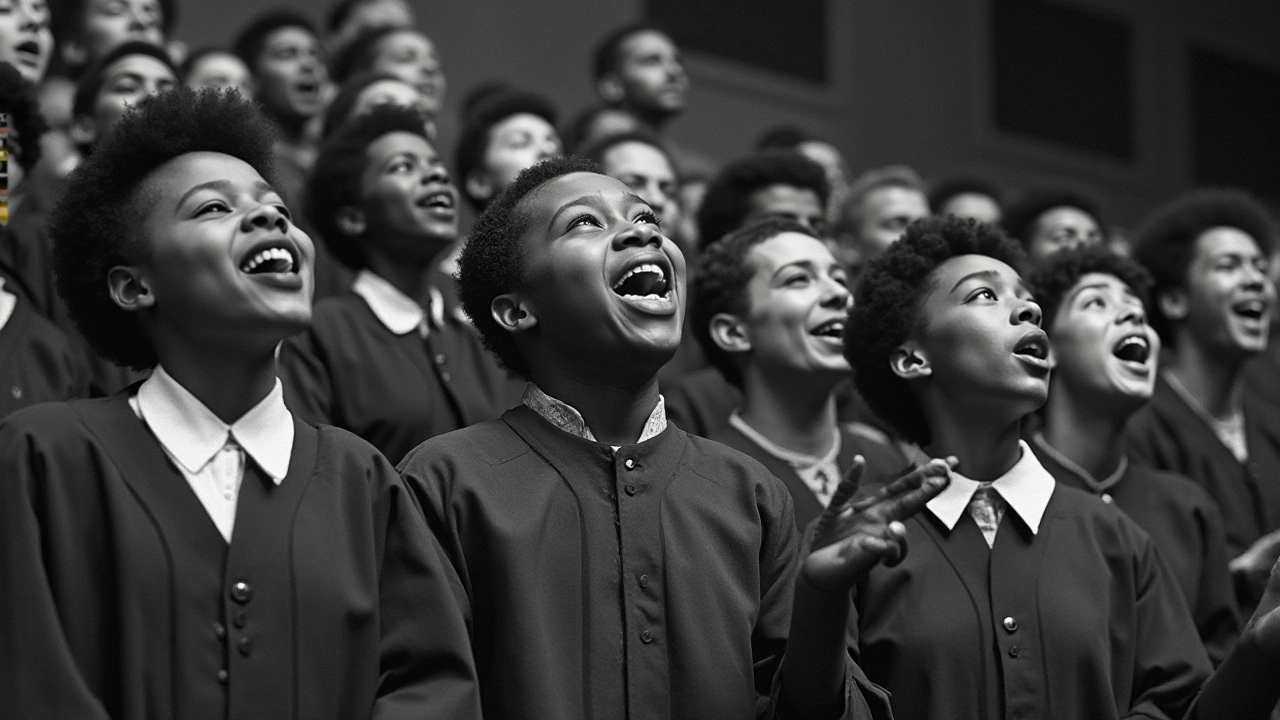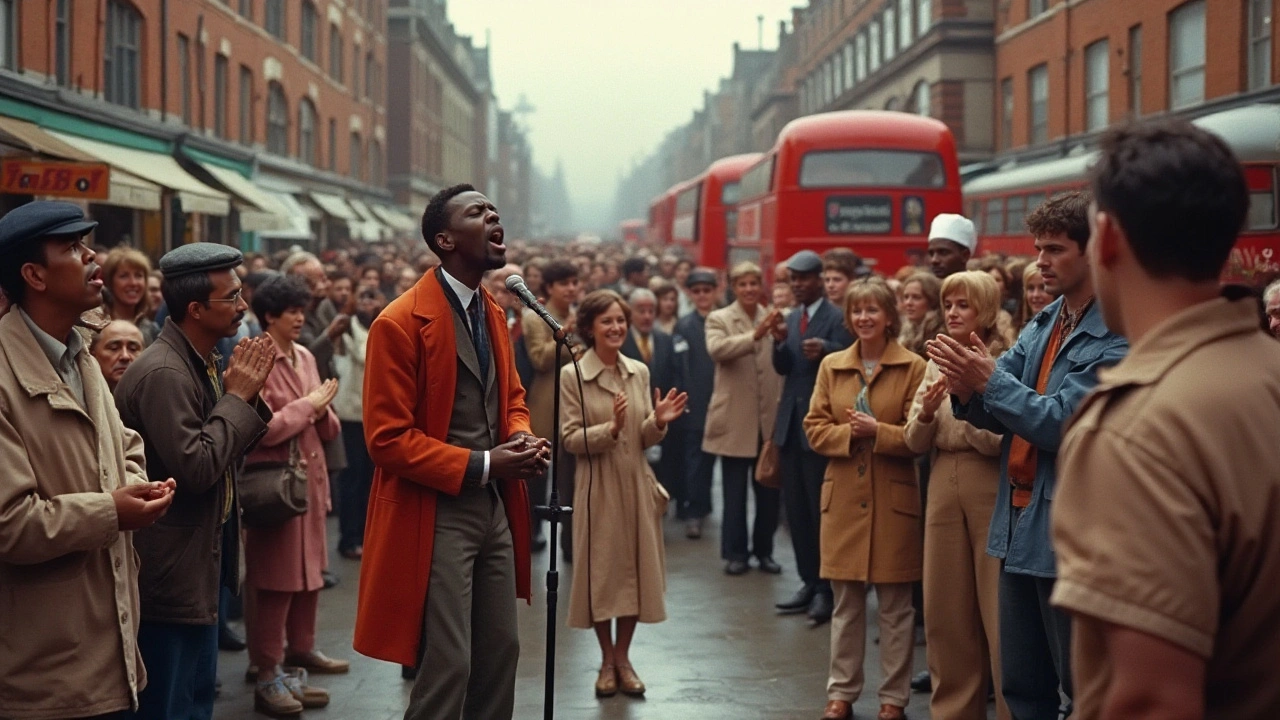Soul music embodies the spirit of resistance and the promise of hope. Emerging from African American communities, it uniquely blends gospel, blues, and rhythm and blues into a sound that moves both hearts and minds.
Born in the mid-20th century, soul music quickly became a beacon for social change. It wasn't just about melodies; it was about meaning. During the civil rights movement, soul artists like Sam Cooke and Aretha Franklin turned their songs into anthems of empowerment, uniting people through their resonant messages.
Today's music scene continues to feel the impact of soul. The genre's influence can be heard in everything from pop to hip-hop, proving that its roots are deep and its branches widespread. It's a testament to the enduring power of music as a force for unity and hope.
- The Birth of Soul Music
- Soul Music and Social Movements
- Legendary Soul Artists
- Impact on Modern Music
- The Global Influence of Soul
- Soul Music Today
The Birth of Soul Music
The birth of soul music is rooted in the rich cultural tapestry of African American history. Emerging in the late 1950s and early 1960s, soul music was a powerful fusion of gospel's spiritual fervor, the raw emotion of blues, and the rhythmic drive of rhythm and blues. This unique blend created a sound that was both deeply personal and universally resonant.
The genre’s origins can be traced back to the African American churches, where gospel music played a crucial role in community life. When gospel singers like Ray Charles and Sam Cooke began incorporating secular themes into their music, they laid the groundwork for soul music. Ray Charles, known as the 'Genius of Soul,' combined the call-and-response patterns of gospel with the lyrical themes of blues, creating hits like ‘What'd I Say’. Sam Cooke, often called the 'King of Soul,' blended smooth melodies with profound lyrical content, exemplified in songs like 'A Change Is Gonna Come'.
This movement was bolstered by the emergence of record labels that championed the genre. Motown Records, led by Berry Gordy, became a powerhouse in the music industry, promoting artists like Marvin Gaye, Stevie Wonder, and Diana Ross & The Supremes. These artists brought soul music to mainstream audiences and used their platforms to address social issues, adding a layer of depth and relevance to the music. Another significant label, Stax Records, based in Memphis, was home to iconic artists such as Otis Redding and Booker T. & the MG's, who infused their music with the gritty, heartfelt sounds of the South.
One of the defining characteristics of soul music is its emphasis on deep emotional expression. The vocals are often intense and passionate, reflecting the struggles and triumphs of the African American experience. Lyrics frequently touch on themes of love, heartbreak, resilience, and social justice, making the music both deeply personal and universally relatable. Aretha Franklin, the 'Queen of Soul,' captured this essence with her powerful voice and hits like ‘Respect’ and ‘Chain of Fools’, which became anthems of both personal and collective empowerment.
As soul music evolved, it began to influence and be influenced by other musical styles. The genre's impact can be seen in the development of funk and later, hip-hop, with artists sampling classic soul tracks to create new and innovative sounds. The Temptations, known for their exceptional harmonies and choreography, bridged the gap between soul and funk with songs like ‘Papa Was a Rollin’ Stone’. James Brown, often referred to as the 'Godfather of Soul,' played a pivotal role in the transition from soul to funk, with tracks like ‘I Got You (I Feel Good)’ showcasing his dynamic energy and rhythmic innovation.
While soul music has its roots in specific cultural and historical contexts, its influence has spread globally. Artists from diverse backgrounds have drawn inspiration from the genre, using its emotive power to express their own experiences and perspectives. This global reach is a testament to the universal appeal of soul music, which continues to inspire and resonate with new generations of listeners. The genre’s ability to connect with people on an emotional level ensures that it remains a vital and enduring part of the musical landscape.
"Soul music is the music that really inspired so many people to think about freedom. It is music that tells the truth about life and love, but also about social justice," says music historian Robert Gordon.
Soul Music and Social Movements
Soul music played a crucial role in the civil rights movement of the 1960s. Songs became the resistance's soundtrack, delivering messages of hope, unity, and determination while resonating deeply with listeners. These songs did more than entertain; they empowered. Artists like Sam Cooke and Aretha Franklin transformed their melodies into anthems of resilience.
One of the most iconic soul songs, "A Change is Gonna Come" by Sam Cooke, became a beacon of hope during tumultuous times. Its lyrics, heavily inspired by the struggles and aspirations of African Americans during the civil rights movement, spoke volumes. Cooke's powerful voice and emotional delivery called for equality and justice, and it became an unofficial theme for the movement.
"Songs are the literature of the people. And as long as people keep singing them, they'll never die." - Stevie Wonder
Aretha Franklin's "Respect" is another seminal track that doubled as a rallying cry, not just for gender equality but also for racial justice. Franklin originally adapted Otis Redding’s song, transforming it into an anthem that demanded dignity and respect for all, particularly for Black women. Her fiery delivery and unapologetic demand for respect encapsulated the spirit of the times.
As soul music grew alongside these social movements, it did more than document the era; it spurred people into action. Marvin Gaye's album "What's Going On" gave voice to a generation grappling with political turmoil, environmental concerns, and inner-city struggles. The album was not just a collection of songs but a narrative arc that explored pressing social issues.
The influence of soul music wasn't confined to African American communities. Its messages reached global audiences, encouraging solidarity and activism worldwide. When listening to Nina Simone's "Mississippi Goddam," people from various backgrounds felt the raw pain and urgency embedded in her voice, inspiring international support for the civil rights cause.
Soul music continued its legacy of social commentary in more recent movements. Alicia Keys and John Legend have leveraged their platforms, releasing songs that address contemporary social issues. These modern artists continue to honor the tradition of using soul music as a powerful tool for change.
This genre remains an essential force in advocating for justice and equality. Its legacy is evident, showing that the fight for human rights can be strengthened through the powerful medium of music. Soul music's ability to convey messages of resistance and hope makes it just as relevant today as it was decades ago.

Legendary Soul Artists
Soul music wouldn't be the profound cultural touchstone it is today without its legendary artists whose voices and messages resonated globally. One of the most iconic figures, Aretha Franklin, often hailed as the 'Queen of Soul,' blended gospel, jazz, and rhythm and blues into a musical force that changed the world. Her rendition of 'Respect,' originally by Otis Redding, became a feminist and civil rights anthem. Aretha's voice carried an emotional depth that could bring listeners to tears, while also lifting spirits. Her influence extended beyond the music charts into social movements, making her an indelible part of American history.
Another towering figure in the realm of soul music is James Brown, famously known as the 'Godfather of Soul.' His electrifying performances and raw, passionate delivery pushed the sonic boundaries of the genre. Hits like 'I Got You (I Feel Good)' and 'Papa's Got a Brand New Bag' are timeless classics that continue to influence modern artists. Brown's dynamic voice and profound stage presence made him a pivotal figure, often considered a bridge to the birth of funk and hip-hop.
Then there's Sam Cooke, whose smooth voice and poignant lyrics made him a standout in the soul genre. Songs like 'A Change is Gonna Come' are not only musical masterpieces but also poignant reflections of the social turmoil of the 1960s. Cooke's tragic death in 1964 marked the loss of a brilliant artist who had much more to give. His legacy, however, lives on through his timeless music and the artists he inspired.
Marvin Gaye, often remembered for his silk-like voice and heartfelt lyrics, brought attention to significant social issues through his music. Albums like 'What's Going On' were directly influenced by the political and social climate of the era. Gaye's ability to convey deep empathy and concern for humanity set his work apart, making him another crucial icon of soul music.
In discussing soul music's greats, we can't omit Stevie Wonder. Blind from shortly after birth, Wonder's extraordinary talent for composition, singing, and playing multiple instruments earned him critical acclaim and commercial success. Albums such as 'Songs in the Key of Life' are masterpieces that explore the depth of human experience, touching on everything from love to social justice.
Acknowledging these legendary soul artists allows us to appreciate the depth and breadth of the genre. Their contributions laid the groundwork for the fusion of soul with other musical styles and solidified its role as a powerful medium for expressing resistance and hope. As listeners, we continue to feel the reverberations of their genius in modern music and in the ongoing fight for equality and justice.
Impact on Modern Music
Soul music has made an indelible mark on modern music, shaping genres and influencing artists worldwide. The core elements of soul—its emotional depth, powerful vocals, and rhythm—have resonated through decades, embedding themselves in various musical styles. Soul's influence can be prominently heard in genres such as pop, R&B, hip-hop, and even rock. The emotive storytelling and raw emotional expression at the heart of soul music have inspired countless artists to embed similar elements into their work.
A prime example is the work of Adele, whose soulful voice and emotional depth have drawn comparisons to soul legends like Aretha Franklin. Her songs, rich with themes of love and loss, are a testament to soul's enduring power to convey deep, universal emotions. Similarly, artists like Bruno Mars and Beyoncé have seamlessly blended soul elements into their chart-topping hits, creating a fusion that appeals to a broad audience while staying true to the genre's roots.
In the world of hip-hop, the impact of soul music is unmistakable. Producers frequently sample old soul tracks to create new beats, giving a nod to the genre's lasting legacy. For instance, Kanye West's use of Curtis Mayfield's

The Global Influence of Soul
Soul music's impact extends far beyond the borders of the United States. This powerful genre has found a home in virtually every corner of the globe, touching diverse cultures and inspiring countless artists. Its ability to resonate with universal themes of love, struggle, and hope has cemented its place in the global musical landscape.
The UK was one of the first countries outside the US to embrace soul music fervently. In the 1960s, British bands like The Beatles and The Rolling Stones began incorporating elements of soul into their work. This cross-pollination helped soul gain international traction and inspired a wave of UK artists to develop their own soulful sounds. Northern Soul, a movement that emerged in England during the late 1960s and 70s, specifically celebrated American soul music, leading to thriving dance scenes and a rich exchange of musical ideas.
Meanwhile, in Africa, soul music became intertwined with the fight for independence and social justice across the continent. Artists such as Fela Kuti infused soul elements into Afrobeat, creating a powerful hybrid that echoed the continent's strive for freedom. Similarly, in South Africa, soul music influenced the anti-apartheid movement, with musicians using their art to vocalize the yearning for equality and human rights.
Japan’s soul scene also burgeoned in the late 20th century, with Japanese artists garnering acclaim for their own unique takes on the genre. Tokyo became a hotbed for soul nights, where enthusiasts would gather to enjoy classic tracks and new releases alike. Japanese soul bands like The Boom and artists such as Mariya Takeuchi started to gain recognition, proving that soul's ethos could be interpreted and loved within any cultural context.
In Latin America, soul music blended seamlessly with local genres, giving birth to vibrant and infectious sounds. The influence of soul can be heard in salsa, samba, and pop music across Latin American countries. Artists such as Rubén Blades in Panama and Tim Maia in Brazil took the emotional depth and rhythmic potency of soul and merged it with their traditional musical styles, creating something entirely new yet deeply familiar to their audiences.
"Soul music is like a universal language; it speaks directly to the heart, cutting across language barriers and cultural divides," said Quincy Jones, a legendary music producer and conductor.
Australia's own soul scene has similarly flourished over the decades. Indigenous Australian artists have used soul music to express their experiences and struggles. The genre's themes of resistance and perseverance strike a chord with the fight for the rights of Aboriginal peoples. Bands like The Bamboos have been at the forefront of Australia’s contemporary soul movement, garnering international acclaim.
The internet and streaming services have only accelerated the spread of soul music globally. Artists from different continents collaborate more easily, sharing their unique cultural spins on the genre. This fusion has led to a rich, ever-evolving global soul music scene, proving that the genre that's built on community and collective experiences is here to stay.
Soul Music Today
Soul music has continued to evolve, even as it maintains its core essence of expressing deep emotion and advocating for change. Today, the genre bears witness to a new generation of artists whose work carries forward the legacy of pioneers like Sam Cooke and Aretha Franklin. These modern torchbearers infuse their music with contemporary sounds while keeping the spirit of soul music alive.
One of the most notable aspects of soul music today is its seamless blending with other genres. Artists like Leon Bridges have revitalized the traditional soul sound, adding a modern twist that appeals to both older and younger audiences. His album, 'Coming Home,' echoes sounds from the golden era of soul while still feeling fresh and relevant in today's music scene.
More than just music, soul today continues to be a platform for social commentary. Artists like Alicia Keys and John Legend use their influence to address issues ranging from racial inequality to mental health. Their songs often serve as calls to action, much like the soul anthems of the past. This commitment to advocacy underscores that resistance and hope remain central themes in soul music.
As John Legend once said, "Music can force you to pay attention, and awaken you from your slumber."This quote perfectly captures the power that soul music still holds. It's not just about entertainment; it's about enlightenment and empowerment.
While traditional sales of albums have dwindled, platforms like Spotify and Apple Music have enabled soul music to reach a global audience. This accessibility has also fostered collaborations across continents. British singer Jorja Smith, for instance, incorporates elements of soul into her work, proving the genre's universal appeal.
Emerging soul artists are also making waves. Yola's Grammy nominations have put her on the map as one of the key figures in contemporary soul. Her music encapsulates the struggle and joy that are hallmarks of the genre.
Technological Influence
The role of technology in soul music today cannot be overstated. With the advent of social media and streaming services, artists can share their music widely and cultivate a dedicated fan base without the backing of major labels. This democratization of the music industry has given rise to more authentic and diverse voices within the soul genre.We are also witnessing the revival of vinyl records, which has brought an analog feel to modern soul music. Many believe that the warmth of vinyl complements the raw emotion often found in soul music, offering a richer, more immersive listening experience.

